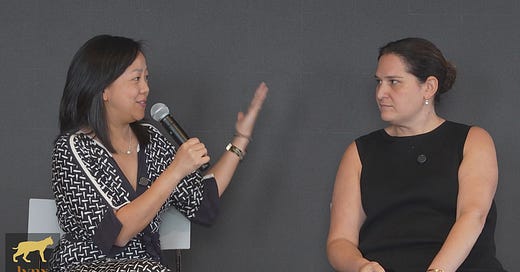Have 2 min? Help us understand who you are and what you want to read by taking our reader survey - thanks!
Union Square Ventures is one of the most storied venture capital firms in New York City. The firm has a long track record of generating significant returns from companies such as Twitter, Etsy, Coinbase, Duolingo, Carta and many more. A few weeks ago, we had the opportunity to host one of our Inside VC talks with Rebecca Kaden, Managing Partner at Union Square Ventures. It was such a rich conversation that I’ve been thinking about it ever since. Here are a few highlights.
A Thesis-Driven Investment Firm
Union Square Ventures is the epitome of a thesis-driven firm. At a very high level, their investment thesis focuses on markets undergoing structural change. The firm looks for startups that use software to challenge entrenched institutions, shift control to individuals, and unlock new access to data. Their approach has evolved slightly, but the overall intent has always remained the same. Early on, they focused on large networks of engaged users; today, their stated interests are in the areas of programmable intelligence, energy, bio and money.
The partners all invest across these themes and go deep to learn about all of them. Their team even dedicates 2 hours a week to spend time learning and teaching each other.
How USV Partners Make Investment Decisions
Union Square Ventures makes investment decisions through a consensus-driven process. Partners work together to evaluate whether a company aligns with the firm’s thesis, using shared documents to exchange questions and insights. Founders are often included in this process, allowing for real-time dialogue. The goal is to build shared conviction rather than rely on individual advocacy. Since there is a lot of involvement from all 6 partners, they are patient and take their time to build conviction. However, since they already spend so much time learning about their specific focus themes, if they have already formed a thesis around a topic, they may make a related investment decision much more quickly.
What Rebecca Looks for in Founders
Rebecca tends to look for founders who demonstrate a combination of clarity, depth and authenticity. When evaluating founders, she wants to see that they:
Are building in the category for a specific reason: Rebecca prefers founders with a strong personal connection to the market they are tackling. She looks for clear motivation or an unfair advantage that makes them uniquely suited to solve the problem.
Are great storytellers: A strong product is not enough. Founders need to clearly articulate their vision to investors, employees, customers, and partners. The best storytellers can move between high-level strategy and getting in the details with ease.
Know the details of their business: The most compelling founders are hands-on and deeply familiar with their company’s numbers, metrics, and operations. They can speak confidently about the details without needing to defer to others.
Are transparent: Transparency is a baseline requirement. If a founder appears to be concealing or reframing information, no matter how promising the business may seem, Rebecca steps away. Trust and openness are essential from the start.
Have focus: Focus is one of the most important traits in successful founders. The best teams make deliberate tradeoffs, avoid feature creep, and prioritize clearly. Rebecca looks for founders who know exactly what bet they are making and are not distracted by trying to do too much at once.
How AI Is Helping Founders Build More Efficiently
Rebecca believes AI is fundamentally changing how startups operate. Founders who integrate AI tools across key functions, from finance to product development, are able to move faster and build with fewer people. This creates a new level of efficiency that allows capital to go further. In today’s environment, that efficiency is not just beneficial—it is a major competitive advantage.
Thanks again to Rebecca for sharing her wisdom. Watch the video above to hear even more directly from her, especially if you’re a founder looking to raise a seed or Series A round of funding in your future.












Share this post